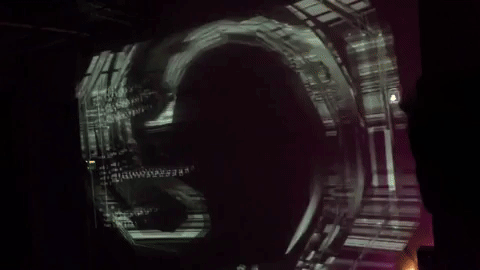Wednesday night’s visitors to Eyebeam could hear the music and see the flashing lights as they approached the entrance to the building, on Cook Street, in Bushwick.
Inside, the scene looked like a normal music event, too, with a check-in booth at the door and a table for beer and wine in the corner and about 50 people milling around, some dancing to heavy bass notes. What was different was that there wasn’t anyone playing instruments or even a DJ. Instead, the artists were writing computer code, live, programming the music and lights in languages like Clojure and Haskell.
One performer even created his own programming language for the performance.
“Software becomes this other instrument in the same way of a piano or a flute,” explained Ramsey Nasser, the organizer of the event, which was called Algorave. “The difference is that you can very efficiently express things like a pattern that loops and grows on its own over time. Instead of having a relationship with each individual note, you’re sort of constructing the shape of the overall piece and the computer is running with it. It’s much less about the dexterity and mastery of a physical instrument and more about being able to sculpt a piece on the fly, as you go.”
Nasser is a member of LiveCodeNYC, a collective of artists and hackers which has met every two weeks for about the last three years. Everyone in the collective makes their own tools to write their own music that can be performed live. Its members perform at these shows around the city every month. The group merges with another group, called Algorave, which is a decentralized and global phenomenon that lists similar shows around the world. Nasser said the live coding scene is particularly big in Mexico City and Sheffield, England.
Performing in front of people can be stressful but at least most performers have the benefit of practices and rehearsals. The artists at Algorave, however, were composing new music in front of their audience.
“It’s extremely stressful,” Nasser said, laughing, when asked what it was like when he himself performs (he was the closing act of the show that night). “The thing about programming in any modern language is that they have a property called Turing Completeness, which means they can provably do anything. Which means that all kinds of stuff can go wrong on stage, so a big part of performing this way is figuring out how to defend against chaos.”
With most of the pieces at having a Reichian, looping nature, the name of the game at Algorave all night was hearing the tension between programmatic order and creative chaos.
The next Algorave in New York will be April 20 at PS122, a performance space in an abandoned school in the East Village.
Before you go...
Please consider supporting Technical.ly to keep our independent journalism strong. Unlike most business-focused media outlets, we don’t have a paywall. Instead, we count on your personal and organizational support.
3 ways to support our work:- Contribute to the Journalism Fund. Charitable giving ensures our information remains free and accessible for residents to discover workforce programs and entrepreneurship pathways. This includes philanthropic grants and individual tax-deductible donations from readers like you.
- Use our Preferred Partners. Our directory of vetted providers offers high-quality recommendations for services our readers need, and each referral supports our journalism.
- Use our services. If you need entrepreneurs and tech leaders to buy your services, are seeking technologists to hire or want more professionals to know about your ecosystem, Technical.ly has the biggest and most engaged audience in the mid-Atlantic. We help companies tell their stories and answer big questions to meet and serve our community.
Join our growing Slack community
Join 5,000 tech professionals and entrepreneurs in our community Slack today!


